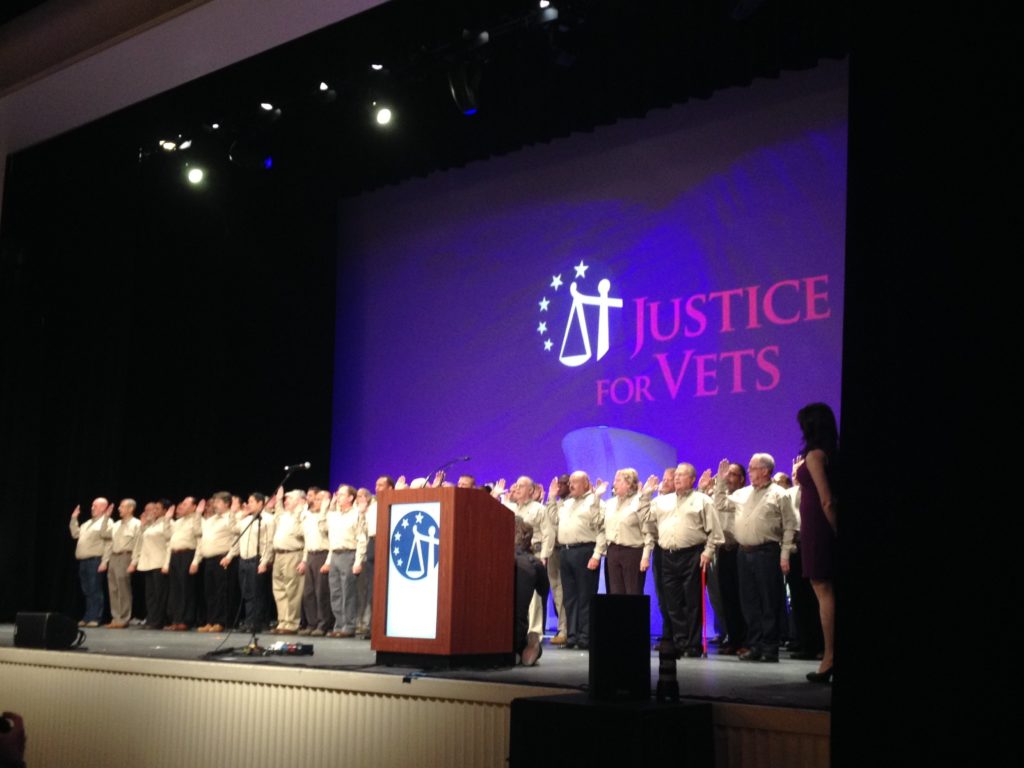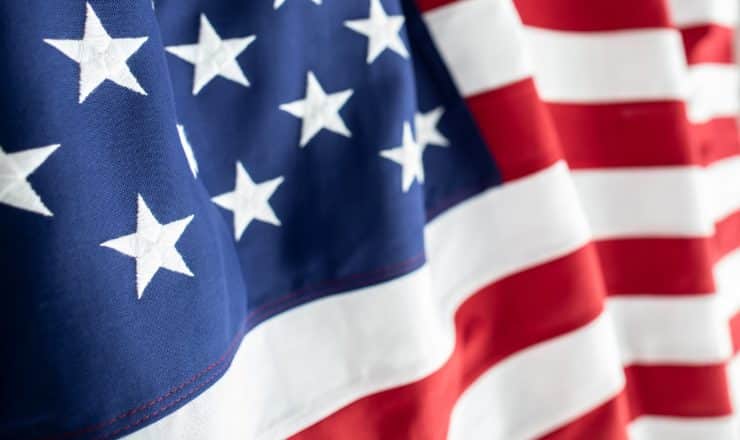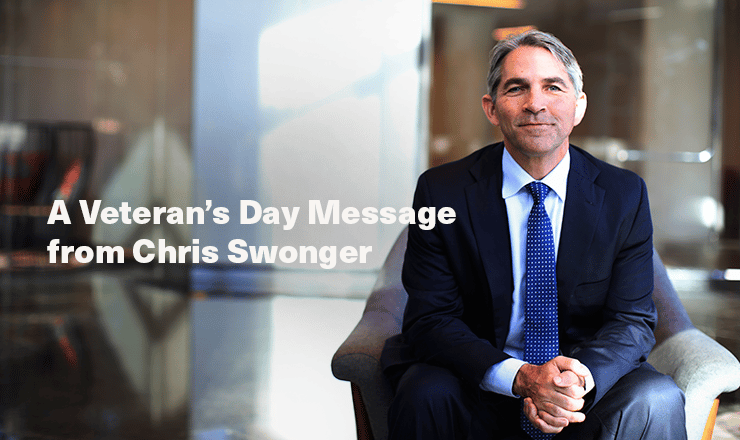Justice for Vets works to help those brave Americans who have fought for our freedom
Every November 11th, on the anniversary of the WWI armistice, we honor the patriotism and personal sacrifice of those who have served their country. On this day, we celebrate the heroism, valour, and leadership of our military service men and women.
Since 1918, veterans have returned from many arenas of conflict (Europe, the Pacific, Korea, Vietnam, and more recently, in excess of a decade of conflict in the Middle East). The experience of military service and the journey home for veterans can be wrought with challenges and struggle. We have seen the toll that both the visible and invisible wounds of war can exact on these brave men and women. Sometimes, it takes a community to help a veteran return and to assist them in leaving trauma behind. It can take a community to help them find peace, serenity, and comfort at home.
In a guest blog for Responsibility.org, Melissa Fitzgerald, Senior Director of Justice For Vets, shares the story of the establishment of the first Veterans Treatment Court and the role that her organization plays in helping those service members who struggle on the home front find structure, support, and treatment. Let us remember on this Veterans Day that these brave men and women fought and sacrificed for our freedom. Through the widespread use of these life-saving specialty courts, we can join together in fighting for theirs.
Responsibility.org thanks all veterans and active military service members for their selfless commitment to protecting the freedom of all.
___________________________________________________________________________________________
Our veterans are one of our nation’s greatest and most valuable assets. The vast majority of our veterans are strengthened by their military service, but everyone’s path to returning home is not the same. Some veterans need our help.
In 2007, a Buffalo, NY judge named Robert Russell began seeing an increase in the number of veterans appearing on his Drug Court and Mental Health Court dockets. Many veterans he saw were battling severe mental health issues, such as Post-Traumatic Stress Disorder, and physical issues such as Traumatic Brian Injury. In many cases these conditions were exacerbated by substance abuse, in others substance abuse was the primary concern.
One day during his Mental Health Court docket, he called the case of a Vietnam veteran who to that point was completely unresponsive. He would show up to court, but wouldn’t participate in counseling, and he wouldn’t communicate with Judge Russell. So Judge Russell asked two members of his court staff, Hank Pirowski and Jack O’Connor, themselves Vietnam veterans, to take the gentleman out in the hall and talk to him vet to vet. They talked for an hour and when they were finished, Judge Russell recalled the case. The man walked up to the bench, stood at parade rest, and held his head high. Judge Russell asked him if he was ready to accept the treatment that was being offered. The man looked Judge Russell in the eye and said, ‘yes sir.’
At that moment Judge Russell decided to take action. He and his team immediately set out to create a veterans-only docket where veterans were surrounded by their peers and offered treatment and services specific to their needs. While maintaining the traditional partnerships and practices found in his Drug Court, Judge Russell brought to the table U.S. Department of Veterans Affairs health care networks, the Veterans Benefits Administration, volunteer veteran mentors from the community and veterans' family support organizations. In early 2008, Judge Russell launched the nation’s first Veterans Treatment Court igniting a spark that has blazed across the country, and fundamentally changed the way veterans are handled in the criminal justice system.
Surprisingly, little is known about the intersection of veterans and the justice system.
- In 2007 (the most recent year for which statistics are available), the Department of Justice found 703,000 veterans under some form of correctional supervision.
- The Substance Abuse and Mental Health Administration (SAMHSA) estimates that 1 in 6 Iraq and Afghanistan veterans are alcohol and/or drug dependent and 1 in 5 suffer from PTSD or a significant mental health disorder.
- A recent report released by the Washington Post found that more than half of the 2.6 million returning service members from the Iraq and Afghanistan conflicts struggle with physical or mental health problems stemming from their service and feel disconnected from civilian life. Many also feel that the government has failed in meeting the needs of returning veterans.
Since Judge Russell launched his program in 2008, Veterans Treatment Courts have gained national prominence as the most innovative solution for veterans who find themselves in contact with the criminal justice system. The number of Veterans Treatment Courts increased by 28% between 2013 and 2014, and there are now 264 in operation in 37 states and one U.S. territory (Guam). These programs stand between the veteran and a felony conviction, incarceration, or worse. These courts not only provide the structure and accountability that veterans require, they also ensure that when returning service members are arrested for crimes linked to substance abuse and/or mental health disorders, that they receive the treatment and mentoring they need to get their lives back on track.
Today, more than 13,200 veterans are receiving life-saving treatment in Veterans Treatment Courts across the country.
In February, the Community Mental Health Journal released the first published study on Veterans Treatment Courts. The findings are incredibly promising: veterans who participate in these programs experienced significant improvement with depression, PTSD, and substance abuse as well as with critical social issues including housing, emotional well-being, relationships, and overall functioning. The study also found that mentoring from volunteer veterans is particularly effective. Veterans who receive mentoring not only experience better clinical outcomes, they report feeling more socially connected.
Justice For Vets leads the national effort to establish Veterans Treatment Courts within reach of every veteran in need, provide ongoing training and technical assistance to the VTC field, shaping public opinion through aggressive media outreach, and advocating for state and Federal legislation, and annually hosting Vet Court Con, the nation’s only training conference dedicated to justice-involved veterans. We also understand that there are few bonds as strong as the one between those who have served their country, and are building a National Mentor Corps of volunteer veterans to serve in Veterans Treatment Courts.
We do all of this because veterans who struggle on the home front and become involved in the criminal justice system are capable of amazing transformation. In Veterans Treatment Court, we fight for their freedom; freedom from addiction, freedom from homelessness, and freedom from mental anguish. Veterans fought for our freedom, join us in fighting for theirs. Visit www.JusticeForVets.org.
*The views and opinions expressed in this blog are solely those of the author and do not necessarily reflect the views of the Foundation for Advancing Alcohol Responsibility (Responsibility.org) or any Responsibility.org member.*



